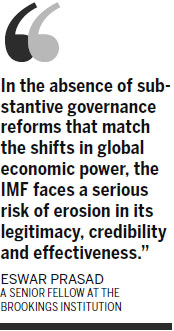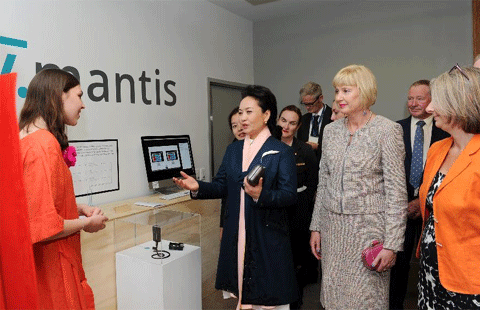Pessimism over US Congress on IMF reforms
Updated: 2014-11-21 15:23
By Chen Weihua in Washington(China Daily USA)
|
||||||||
As experts descend on Washington to discuss global economic governance, some have expressed disappointment with the US Congress for blocking relevant reforms.
Jose Antonio Ocampo, former undersecretary general for economic and social affairs at the United Nations and now a professor at Columbia University in New York, said Thursday said he is "relatively pessimistic" about any action, even after the midterm elections earlier this month.
Ocampo called the 2010 reform rolled out by the International Monetary Fund and World Bank on quotas and voting rights the beginning of the reform process rather than the end.
Speaking at the Stimson Center in Washington, Ocampo, a former finance minister in Colombia, stressed the importance of a fair and well-represented international governance system that reflects world realities. He and other experts are in Washington to discuss topics of global economic governance and its role in security and justice.

The 2010 IMF reform would make China the third largest member and also allow more of a say for emerging nations such as Brazil, India and Turkey to reflect their fast-growing economies.
But the US Congress has not ratified the reforms. It is the only country that holds a controlling share - 16.8 percent - of IMF votes. Major IMF decisions require 85 percent approval. Ocampo said that a coalition of countries can join together to exercise veto power.
IMF Managing Director Christine Lagarde has called on the US to stop blocking the reforms.
"The 2010 governance quota reform is an absolute must," she said at the IMF/World Bank annual meeting last month. "It has to be implemented, and everybody knows that it is currently stuck before the US Congress."

Lagarde had hoped the US would understand the relevance of an IMF that is representative of the global economy. "Now this has not happened," she said.
Eswar Prasad, a senior fellow at the Brookings Institution, described the recent shifts in the US political landscape as not a good omen for IMF reforms.
"It is unlikely that there will be an easy path to compromise between the two political parties on this issue," he told China Daily on Thursday. "This is ironic, as lack of progress on IMF reforms will ultimately affect American influence in this and other multilateral financial institutions."
Prasad believes that sidestepping the US to pass the reforms would be undesirable, as it could lead to the US becoming less engaged with the institution.
"The grim reality is that there are no easy options for the IMF to preserve its legitimacy and effectiveness in the absence of US ratification of the governance reforms, an unlikely prospect at this stage," said Prasad, a professor at Cornell University and a former IMF chief in China.
To Prasad, even the delayed 2010 quota reform represents only a modest step toward changing the governance structure of the IMF to reflect shifting economic realities.
"Failure to make progress even on this modest reform raises serious questions about the IMF's shaky legitimacy and influence," he said.
"In the absence of substantive governance reforms that match the shifts in global economic power, the IMF faces a serious risk of erosion in its legitimacy, credibility and effectiveness," Prasad said.
Speaking at the Brookings two weeks ago, former US National Security Advisor Tom Donilon said failure to act on the reforms is detrimental to the US.
chenweihua@chinadailyusa.com

 Chocolate warriors with Christmassy characteristics
Chocolate warriors with Christmassy characteristics
 Trending: Panda beating video triggers outrage
Trending: Panda beating video triggers outrage
 Culture Insider: 7 things you may not know about Minor Snow
Culture Insider: 7 things you may not know about Minor Snow
 The future of the Asian Pacific
The future of the Asian Pacific
 Early start to family life
Early start to family life
 Chinese lantern festival is coming to California
Chinese lantern festival is coming to California
 Across America over the week (Nov 14- Nov 20)
Across America over the week (Nov 14- Nov 20)
 Peng Liyuan visits Massey University in Wellington, New Zealand
Peng Liyuan visits Massey University in Wellington, New Zealand
Most Viewed
Editor's Picks

|

|

|

|

|

|
Today's Top News
China's interest rates cut to bolster growth
Banner year for US, NYC real estate investment: Panel
Obama takes executive action on immigration
China's central bank cuts interest rates
Chinese lantern festival is coming to California
Cookstove technology key in fighting pollution
Chinese supercomputer still top-ranked
Pessimism over US Congress on IMF reforms
US Weekly

|

|








